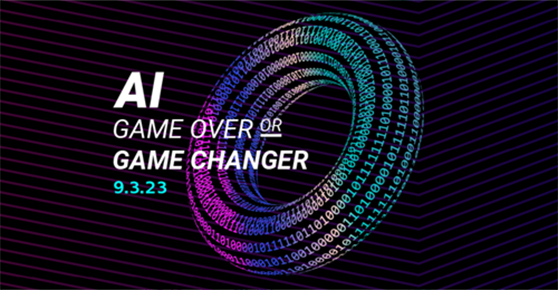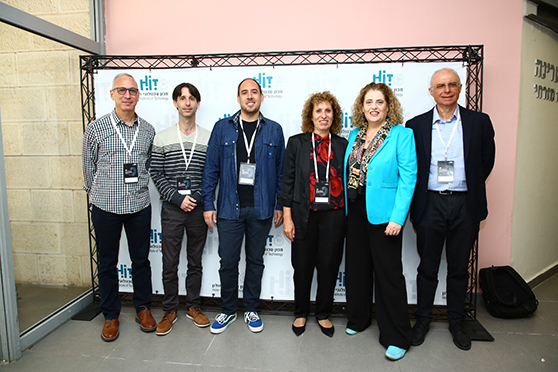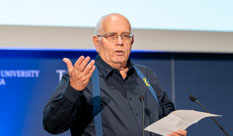More:
News & Stories
AI Game Over or Game Changer” AI Conference at HIT - The future is already here
Over 200 participants filled the auditorium at HIT - Holon Institute of Technology, in one of the most interesting, innovative, and relevant conferences held this year.

"Happy Artificial Intelligence Day!" greeted Prof. Eduard Yakubov, President of HIT, who opened the conference: "We are proud to be among the first to start trying to understand the role of the engineer or doctor in the AI era." In his remarks, Prof. Yakubov revealed that HIT has received permission from the Council for Higher Education to submit for approval an English language Master's Degree Program in of Artificial Intelligence and Robotics with and without a thesis.
Artificial intelligence is a field that has been present in our world for many years, with diverse applications. Recently, the discourse has increased following the release of products such as the ChatGPT and the Dall-e image generator, which have gained more than a million users in less than a week.
"Please don't make the mistake of claiming that we know how the human brain works - we don't. Progress is our true and constant motivator. The way to move forward is through renewal and innovation based on knowledge that already exists. It is incorrect to attribute the fall of an apple on Newton's head as proof that the force of gravity exists. It is more likely that if an apple fell on the scientist's head, it was a sign for him to understand that this is the same force that causes the planets to revolve," says Prof. Adir Pridor, Chairman of the Executive Committee.

Conference Speakers | Photo: Ofer Amram
“It was only 100 days ago that the GPTChat was launched with great fanfare by the company OPENAI. It rapidly became clear that it is an applied and useful tool that can help us perform a multitude of actions in our daily lives, and even in our professional lives.”
The progress of technology is taking place so rapidly that it causes panic among entire sectors of the employment world, and fear of job losses, "I remember how much we waited for the Bezeq phone line in my youth. Everyone thought it would change the world and now, is there anyone in the audience who does not have a smartphone? And if there is anyone without a smartphone here today, doesn't he/she feel like they’re back in the Stone Age?" asked Prof. Shaul Bar Lev, HIT Rector.
The future is around the corner
After Opening Remarks, the first lecture of the conference by Dr. Eran Gal, Head of the MA program in the Faculty of Learning Technologies, and Gideon Zeiler, Chairman of Methodica, offered a quick overview of the development of artificial intelligence tools and our experience as humanity in dealing with them. "The development is definitely at a dizzying and ever-accelerating pace.
The skepticism is there, but it should be more tempered. You can see that the same claims heard against the Gutenberg press are very similar to the claims heard today against the GPTChat " said Dr. Gal. He shared an anecdote about a color-blind man who, through AI, began to work in graphic design, without prior knowledge or appropriate visual tools. This is just an example of how AI enables us to enter a new professional realm without the traditional skills. “It is going to happen again and again”.
"Is the age of originality over?" asked Dr. Nana Ariel, a researcher and lecturer at Tel Aviv University. She was referring to the GPTChat end-products. Dr. Ariel expressed her concern even further: "We are entering the age of ‘fake news’ in academia as well, and it scares me to death. After all, students can easily use artificial intelligence tools for papers and exercises, and it is not clear whether the lecturer will have the ability to know after the fact.
"We have to recognize that ‘the train has already left the station’. We see institutions, even highly esteemed ones like New York University, which have blocked student access to artificial intelligence tools," says Prof. Gila Kurtz, Dean of the Faculty of Instructional Technologies. "Perhaps the best thing to do is to actually harness technology to our advantage. If today many academic works are based on what is called 'regurgitating the material', we can change this and ask the students to share with us the way they prepared it or even test themselves through the use of Chat."
Under the leadership of Dr. Meital Amzaleg, a lecturer and researcher in HIT’s Faculty of Instructional Technologies, a recent survey was conducted in which students were asked about their use of AI tools such as GPTChat and Dall-e. From their responses, it seems that they are aware of the pandora’s box being opened through this change in the form of learning. "One of the main questions asked is if we should stop learning to read and write, and the answer, of course, is an unequivocal NO! We are the next generation to oppose the machine - the next Kasparovs".
Dr. Jonathan Schler, Head of the School of Computer Sciences at HIT, opened his lecture with an apology. He explained that the name of the lecture was drawn from the Jewish source “Ethics of the Fathers – Pirkei Avot”: "Know from where you came and where you are going and before whom you are destined to give account and reckoning” is indeed a verse from the Jewish prayer that refers to the end of a person's life, but today, Dr. Schler points out that it is actually the result of something new that continually raises ethical questions. "Accountability rests on everyone’s shoulders, both the users and the creators. It's not a matter of good and bad. It's a matter of what use we make of it. Let's do good things with it (AI) and advance humanity!" concluded Dr. Schler.
One of the sectors that is changing the fastest is the health sector, which has been completely transformed by the introduction of artificial intelligence products. Prof. Arriel Benis, Head of the Department of Digital Medical Technologies at HIT, reviewed the world of medical artificial intelligence, from the Macy's System in the 1960s to the GPTChat in 2023. "We are seeing phenomenal progress when it comes to the world of medical imaging. The chance of success using artificial intelligence has increased by 99 percent, but is the profession itself going to disappear from the world? Not sure! Because there is still a problematic percentage that requires gathering of experts for consultation and analysis," said Prof. Benis.
A special panel held as part of the conference, moderated by Dr. Nava Shaked, Head of the School of Multidisciplinary Studies at HIT, dealt with one of the most burning issues in the world of artificial intelligence: "What will the employment market look like following the new developments?"
Zvi Feuer, CEO of Siemens Industrial Software in Israel, claims that their only concern is physical harm to an employee because of a tool wrongly operated by AI, but beyond that, he predicts that the development will be good for all of us in the not-too-distant future.
Avi Snir, CEO and founder of ELEVATION, says that he is not worried that jobs will disappear because according to all the forecasts, the employment market is actually expected to grow. He continued, however, by adding a proviso that it is worth focusing attention specifically on those who will not accept the change such as older people or those who lack a technological orientation, which will lead to an increase social inequality.
Daniel Schreiber, CEO and Founder of “Lemonade”, a company that deals with the worlds of insurance by combining advanced technology and artificial intelligence, was asked about the area where he thinks the biggest change is expected with the introduction of AI tools. "I'm not panicking. I'm in denial. In the next 5 years, we are expected to see dramatic changes in the field of medicine. Today you can get 1.5 giga-bytes of information from a single blood sample," says Schreiber.
Ziv Katzir, Director of the National Infrastructure Program for Artificial Intelligence at the Israel Innovation Authority, says optimistically that Israel's strength in AI gives us an advantage to address the climate issue. He continued by urging the State to invest its resources in the field.
The conference was closed with the lecture of Dr. Dan Kohen- Vacs, Head of the BA program in HIT’s Faculty of Learning Technologies, and Yanay Zaguri, a senior lecturer in the faculty, who deals with what is already being called the profession of the future - "prompting" - that is, how to formulate the request to the GPTChat more precisely in order to attain better results. Dr. Kohen-Vacs and Zaguri listed principles that include, among others, style, phrasing, provision of examples and more, all of which can be employed to achieve greater accuracy in the response of the Chat.
"I trust that HIT, as an institute of technology, will best know how to integrate the GPTChat in the most effective way into the study curriculum. This expression of confidence was written by one of the students who participated in Dr. Amzalag’s survey among students and lecturers from all over the country.
HIT - Holon Institute of Technology is indeed proud to be at the forefront of technological advancement and to continue to be a home for important and interesting conferences of this type on the burning issues which affect the lives of all.
- News & Events
New Collaboration with Sheba Medical Center will qualify nurses to work in a digital environment.
Collaboration between HIT Holon Institute of Technology, the teaching authority of the Sheba Medical Center, and the Sheba-BEYOND virtual hospital will allow training nurses in Israel and around the world to work in a digital...



 Additional programs
Additional programs
